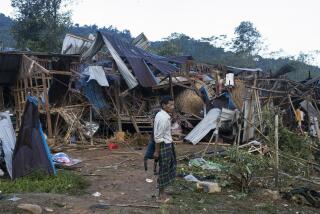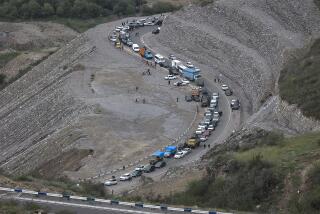Serb, Bosnian Army Chiefs Agree to Build on Truce
SARAJEVO, Bosnia-Herzegovina â Despite broad expectations of renewed fighting once the snow melts, Bosniaâs rival military commanders agreed Wednesday to build on a winter cease-fire by easing the blockade of Sarajevo and allowing U.N. troops to patrol the silent front lines.
The agreement, which would open roads closed since July and give U.N. troops access to conflict areas still flaring 12 days after the truce took effect, came grudgingly after more than 10 hours of tense and often heated negotiation.
If implemented by Saturday, as agreed, the cease-fire expansion and monitoring measures would suggest a greater commitment to winding down Bosniaâs 33-month-old conflict than has been demonstrated by the warring parties before.
Once U.N. troops are positioned between the Bosnian Serb gunmen who control more than 70% of the country and the Muslim-led government army, abandoning the cease-fire after it expires May 1 would be more difficult without targeting the peacekeepers.
The accord also stipulated that regional negotiations are to begin to determine ways of policing the cease-fire in hot spots such as Bihac, where Bosnian Serb attackers have largely halted their offensive but allied Croatian Serbs continue to blast away.
Perhaps even more significant is that the agreement was negotiated directly by the military chieftains, Gen. Ratko Mladic for the Serb rebels and Gen. Rasim Delic for the government side. The two generals had not submitted to face-to-face talks for nearly a year, insisting instead on occupying separate rooms of the sandbagged airport building where the talks are held while U.N. mediators shuttled back and forth to work out agreements.
The U.N. commander for Bosnia, British Lt. Gen. Michael Rose, looked weary from the protracted talks but insisted that the pact was a breakthrough.
âI believe this is a very major step forward,â said Rose, who has less than two weeks remaining in his yearlong stint as Bosnian commander. âI believe this agreement is a demonstration of the firm intent on all sides to make real progress down the path to peace, to achieve during this four-month (cease-fire) period the final, lasting solution to the problems of this country so the people can return to normal, civilized living.â
Rose also said U.N. forces had verified that government troops are now out of a demilitarized zone on nearby Mt. Igman--a problem that had blocked efforts to build on the cease-fire brokered by former President Jimmy Carter.
The provision calling for reopening of two transport corridors across the U.N.-controlled airport could have an inspiring effect on the 380,000 beleaguered citizens of Sarajevo, many of whom should be able to venture out of the encircled city for the first time in six months.
But a similar agreement reached last March that opened roads and allowed some semblance of normal life to return to this shattered capital fell to pieces in summer, when a spate of offensives elsewhere in Bosnia ruptured an earlier cease-fire.
More to Read
Sign up for Essential California
The most important California stories and recommendations in your inbox every morning.
You may occasionally receive promotional content from the Los Angeles Times.











